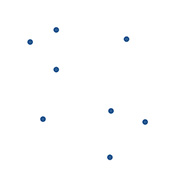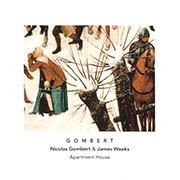 Jürg Frey: Voices [Neu]. For over twenty years now, the Exaudi vocal ensemble has combined exemplary technique with esoteric repertoire and adventurous interperative chops. Director and co-founder James Weeks leads the ensemble through a collection of Jürg Frey’s choral works, an aspect of Frey’s music that has had scant representation on record so far, probably because most of them were composed for Exaudi. All the pieces here are for unaccompanied voices. It’s tempting to call Frey’s approach to grouped voices as descontructive, ignoring the negative connotations that word can evoke, but that sense of taking music apart in different ways to examine how it works its effects on us pervades from one piece to the next. The opening work Out of Chorales begins with repeated chords on single words, isolated by short silences. In successive short movements the number of voices drops away from eight to four, then three, before returning to eight for the final movement, alternating between staggered vocal lines and rhythmic unison. Polyphonie der Wörter is the earlier work here, from 1998, allowing each singer free choice of text from a list of words, set to sequences of unresolved cadences. Any semantic sense from the words are obscured by multiplicity. Frey’s earlier style comes through, with suspended passages of wordless drones sung by the female voices, and one extended silence. Despite this dry formal structure and content, Exaudi transform the piece into something haunting and mysterious. (The singing was all recorded inside Temple Church in London, adding to the ambience.) Shadow and Echo and Jade could well be Frey’s most demonstrative work yet, with two groups of four voices each starting out by trading tones in near monotony, breaking into isolated fragments and then finally unfolding into glorious, radiant chords. The two final works are both settings of Emily Dickinson: Blue Bird’s Tune is a shorter, seemingly more conventional work which displays Frey’s hitherto undiscovered knack for choral writing, creating a mood from nuanced but sober harmonies. A related skill can be heard in the polyphony of Landscape of Echoes, which again applies formal structures to produce an elusive form. The setting of Because I could not stop for Death may be the most ambitious work here, not least because Frey counterposes Dickinson’s text with another by Tang dynasty poet Bai Juyi on the constant renewal of nature amidst loss. Bai’s poem acts as a ground against the Dickinson setting, first as bass against solo soprano, leading into a slow, dreamlike polyphony that keeps a firm control on the verbal and harmonic material. The voices of Exaudi excel at these works which depend upon self-discipline and Frey builds a work of emotive and spiritual power by restraining subjectivity, finding enduring depths in the impersonal, in the manner of other art from outside the romantic tradition.
Jürg Frey: Voices [Neu]. For over twenty years now, the Exaudi vocal ensemble has combined exemplary technique with esoteric repertoire and adventurous interperative chops. Director and co-founder James Weeks leads the ensemble through a collection of Jürg Frey’s choral works, an aspect of Frey’s music that has had scant representation on record so far, probably because most of them were composed for Exaudi. All the pieces here are for unaccompanied voices. It’s tempting to call Frey’s approach to grouped voices as descontructive, ignoring the negative connotations that word can evoke, but that sense of taking music apart in different ways to examine how it works its effects on us pervades from one piece to the next. The opening work Out of Chorales begins with repeated chords on single words, isolated by short silences. In successive short movements the number of voices drops away from eight to four, then three, before returning to eight for the final movement, alternating between staggered vocal lines and rhythmic unison. Polyphonie der Wörter is the earlier work here, from 1998, allowing each singer free choice of text from a list of words, set to sequences of unresolved cadences. Any semantic sense from the words are obscured by multiplicity. Frey’s earlier style comes through, with suspended passages of wordless drones sung by the female voices, and one extended silence. Despite this dry formal structure and content, Exaudi transform the piece into something haunting and mysterious. (The singing was all recorded inside Temple Church in London, adding to the ambience.) Shadow and Echo and Jade could well be Frey’s most demonstrative work yet, with two groups of four voices each starting out by trading tones in near monotony, breaking into isolated fragments and then finally unfolding into glorious, radiant chords. The two final works are both settings of Emily Dickinson: Blue Bird’s Tune is a shorter, seemingly more conventional work which displays Frey’s hitherto undiscovered knack for choral writing, creating a mood from nuanced but sober harmonies. A related skill can be heard in the polyphony of Landscape of Echoes, which again applies formal structures to produce an elusive form. The setting of Because I could not stop for Death may be the most ambitious work here, not least because Frey counterposes Dickinson’s text with another by Tang dynasty poet Bai Juyi on the constant renewal of nature amidst loss. Bai’s poem acts as a ground against the Dickinson setting, first as bass against solo soprano, leading into a slow, dreamlike polyphony that keeps a firm control on the verbal and harmonic material. The voices of Exaudi excel at these works which depend upon self-discipline and Frey builds a work of emotive and spiritual power by restraining subjectivity, finding enduring depths in the impersonal, in the manner of other art from outside the romantic tradition.
 Nicolas Gombert & James Weeks: Gombert [Another Timbre]. Weeks is also a driving force behind this peculiar Gombert album, which apparently really is titled G O M B E R T and is not just a matter of typography. Despite presenting a selection of Gombert’s motets (and a chanson), there are no voices here. Instead, Weeks has arranged these pieces for chamber ensemble: flutes, clarinets, violin, violas and cello – strictly no muſyckinge. Later on, a trumpet appears. The ensemble is Apartment House, who play it as they would with their other contemporary commissions, clean and non-vibrato. What is Weeks trying to achieve with this? It’s not a “re-imagining” (ugh) of Gombert but a way of finding a means to hear Gombert for ourselves, by presenting his musical thinking to us plain. Shorn of verbal significance, historical baggage and churchy resonance, we get a new perspective of this complex but fluid polyphonic artistry. For added perspective, Weeks has composed his own interludes to create space between the arrangements. They are successful in that they don’t attempt to complement or contrast with Gombert, but to provide a pause. Deliberately reduced to little more than two alternating pivots, they announce themselves through the use of piano and the faint drone of a sine tone, with sparse instrumentation. Weeks refuses commentary and instead offers breathing space for reverie, before the polyphony resumes. The album was devised between Weeks and Another Timbre founder Simon Reynell, reflecting his taste for the lucid and unadorned: all detailing here is in its construction. As with Frey, the impersonal gains profundity when it engages with the listeners to reflect upon themselves, rather than be impressed by the artist’s personal sensitivity.
Nicolas Gombert & James Weeks: Gombert [Another Timbre]. Weeks is also a driving force behind this peculiar Gombert album, which apparently really is titled G O M B E R T and is not just a matter of typography. Despite presenting a selection of Gombert’s motets (and a chanson), there are no voices here. Instead, Weeks has arranged these pieces for chamber ensemble: flutes, clarinets, violin, violas and cello – strictly no muſyckinge. Later on, a trumpet appears. The ensemble is Apartment House, who play it as they would with their other contemporary commissions, clean and non-vibrato. What is Weeks trying to achieve with this? It’s not a “re-imagining” (ugh) of Gombert but a way of finding a means to hear Gombert for ourselves, by presenting his musical thinking to us plain. Shorn of verbal significance, historical baggage and churchy resonance, we get a new perspective of this complex but fluid polyphonic artistry. For added perspective, Weeks has composed his own interludes to create space between the arrangements. They are successful in that they don’t attempt to complement or contrast with Gombert, but to provide a pause. Deliberately reduced to little more than two alternating pivots, they announce themselves through the use of piano and the faint drone of a sine tone, with sparse instrumentation. Weeks refuses commentary and instead offers breathing space for reverie, before the polyphony resumes. The album was devised between Weeks and Another Timbre founder Simon Reynell, reflecting his taste for the lucid and unadorned: all detailing here is in its construction. As with Frey, the impersonal gains profundity when it engages with the listeners to reflect upon themselves, rather than be impressed by the artist’s personal sensitivity.
